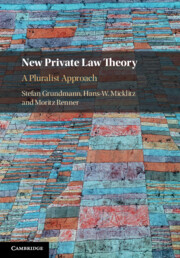Book contents
- New Private Law Theory
- New Private Law Theory
- Copyright page
- Contents
- Preface
- New Private Law Theory
- Part I Methods and Disciplines
- Part II Social Ordering, Constitutionalism and Private Law
- Part III Transactions and Risk: Private Law and the Market
- 11 Negotiation, the Function of Contract and the ‘Justice of Consensus’
- 12 Knowledge and Information
- 13 Private Power
- 14 Non-discrimination
- 15 Risk, Tort and Liability
- 16 Digital Architecture of Private Law Relations
- 17 Between Market and Hierarchy
- Part IV Persons and Organizations
- Part V Private Law (Rule-Setting) beyond the State
- Index
- References
14 - Non-discrimination
from Part III - Transactions and Risk: Private Law and the Market
Published online by Cambridge University Press: 09 April 2021
- New Private Law Theory
- New Private Law Theory
- Copyright page
- Contents
- Preface
- New Private Law Theory
- Part I Methods and Disciplines
- Part II Social Ordering, Constitutionalism and Private Law
- Part III Transactions and Risk: Private Law and the Market
- 11 Negotiation, the Function of Contract and the ‘Justice of Consensus’
- 12 Knowledge and Information
- 13 Private Power
- 14 Non-discrimination
- 15 Risk, Tort and Liability
- 16 Digital Architecture of Private Law Relations
- 17 Between Market and Hierarchy
- Part IV Persons and Organizations
- Part V Private Law (Rule-Setting) beyond the State
- Index
- References
Summary
This chapter discusses the relationship between private law and anti-discrimination law. Both conceptually and politically, the relationship between these two fields of law is as close as it is problematic. The principle of equal treatment is a fundamental and indispensable element of modern constitutional orders – and of law in general. It is clear that this principle is binding for public authorities: governments must treat all citizens equally, the courts must decide like cases alike. The scope of the principle for private actors, however, is much less clear. Private law is based on the principle of private autonomy, and the autonomous decisions of private actors follow private preferences, not the principle of equal treatment. Private actors’ decisions, then, might have discriminatory effects.
- Type
- Chapter
- Information
- New Private Law TheoryA Pluralist Approach, pp. 261 - 271Publisher: Cambridge University PressPrint publication year: 2021



